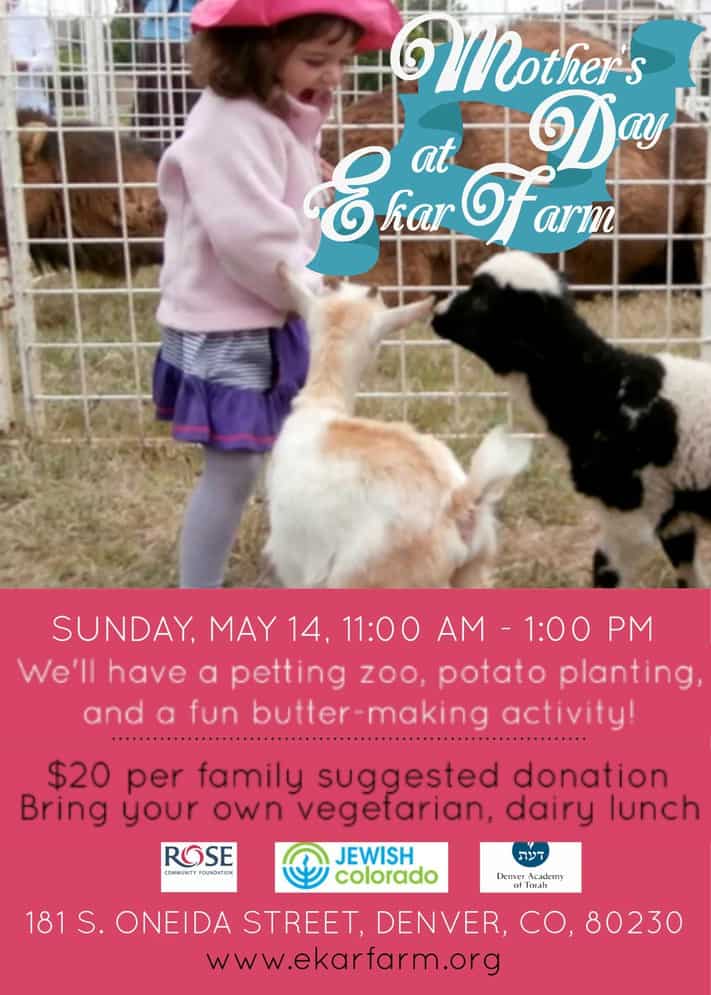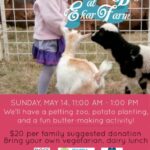by Margot Sands, Ekar Farm – Denver, CO
This week’s Torah portion, Tazria-Metzora, continues to outline specific laws of purification for newborns, mothers, and sufferers of leprosy such as circumcision, immersing in the mikvah, and solitary confinement. Leprosy? Why is this disease addressed alongside the beautiful cycle of life? These different states of being appear together as forms of distractions that prevent us from fully engaging in spirituality. Newborns might be physically distracted from their new existence in the world; new mothers are distracted by on-going pains and stresses of labor and taking care of infants; leprosy is also a physical distraction as an irritating skin ailment. The laws instructed in this text aren’t necessarily targeting these groups of people as dirty, unclean, unwanted, but rather as folks who have barriers to accessing the divine.
While we read this parsha throughout the week, we are also tasked with “Counting the Omer,” an active 49-period of time between Passover and Shavuot. An omer is a measurement of barley that was offered to the Temple in Jerusalem in biblical times everyday until Shavuot as a reenactment of the Jewish people wandering in the desert after being liberated from Egypt. In present times, we count each day with a prayer and intentional focus until Shavuot arrives. Whereas our ancestors’ intentional focus was harvesting barley, our focus becomes a more internal process of our spiritual development. Since today is May 2nd, the 22nd day of counting the omer, we turn our focus toward the value of “endurance.”
How do Tazria-Metzora and the 22nd day of omer counting relate? To overcome any obstacles to spirituality such as the experience of childbirth or a significant illness, we must endure. We must persist against all odds, cultivating our own light in what may feel like darkness. Love can become an essential partner in supporting enduring habits, like a fuel to the fire. When love is involved, we can be unstoppable. As the talented and inspiring Meat Loaf sings, “I would do anything for love.” Thus to foster spiritual endurance, we must foster love.
Since this week’s Torah story speaks to motherhood and Mother’s Day is around the corner, let’s turn toward the love of and for a mother.When I think of mothers, I immediately imagine my own stereotypical Jewish mother who molds artistic minds, cooks a mean brisket, and can talk to any stranger with ease. I also think of any caretaker: biological or treasured guardian; alive or in spirit; human or nonhuman–including the range of wild animals who nourish, defend, and teach their young. The mother and provider of all things that is additionally on my mind is Mother Earth.
How might we hold and share love with all these mothers? How does this love translate into an on-going connection to the divine, the holy, the sacred? For each of us, our expression of love differs. We may foster love by giving tangible gifts, by showing appreciation, or by simply being present. We create opportunities for love by engaging with the mothers of our lives, both for giving and receiving love. When these moments of love occur, they exponentially increase with each interaction. Even through times of struggle love exists and persists. This presence of love transfers over into the spiritual realm by creating more open space for connection, including the most divine ones. When love is present, distractions and obstacles fall to the wayside.

This is why at Ekar Farm, in Denver, CO, we welcome families to embrace the widely celebrated Mother’s Day on the land on Sunday, May 14th. We invite the community to create a space of love on the farm. We will foster these connections and opportunities to honor the mothers of the world through activities like planting potatoes, churning fresh butter, and petting adorable animals. By doing so, we’ll be fulfilling the mitzvah of counting the omer and opening the community to a more spiritual life endured through love.
__
Margot Sands grew up in Phoenix and Las Vegas. Her desert roots made her ripe for being amazed by nature and farming cycles. This amazement thrived in Boston at The Food Project where Margot found her calling of growing food, building community, and teaching young people. As a 2013-2014 FoodCorps Service Member at The Food Project, she realized the power and pleasure of connecting children to their food and wanted to expand her skills in this kind of transformative education. She gained the foundational tools of an emerging JOFEE educator from the Urban Adamah Fellowship and Arizona State University’s M.Ed. in Elementary Education program. Margot is ecstatic to join Hazon’s JOFEE Fellowship as the Lead Educator of Ekar Farm in Denver, CO, and looks forward to building the Denver community toward a more sustainable and spiritual future.
Editor’s Note: Welcome to D’varim HaMakom: The JOFEE Fellows Blog! Most weeks throughout the year, you’ll be hearing from the JOFEE Fellows: reflections on their experiences, successful programs they’ve planned and implemented, gleanings from the field, and connections to the weekly Torah portion and what they’ve learned from their experiences with place in their host communities for the year. Views expressed are the author’s and do not necessarily represent Hazon. Be sure to check back weekly!
